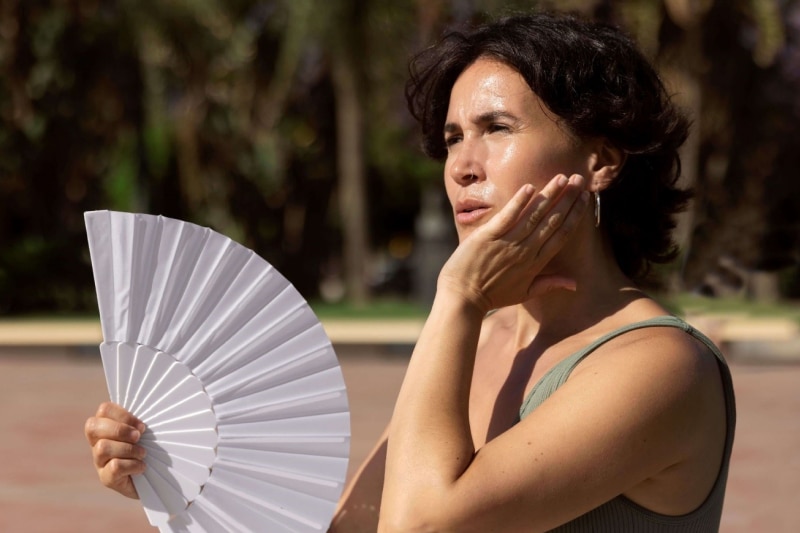Have you ever woken up with damp sheets and soggy pajamas? Most people often wake up like this and it not only makes you feel uncomfortable but adds extra stress to your day. If you’ve suddenly found yourself sweating in your sleep night after night then you need to know that this is your body’s normal, logical response to certain situations.
While sweating or getting warm flashes during the night can be your body’s normal response to lower core temperature if it gets too high, it can also be a matter of concern. However, this can easily be rectified with certain behaviors or changes in your sleep pattern.
Though sweating at night can have something to do with your temperature or environment, certain professionals feel that it could be a health concern. Here are some reasons why you get night sweat and what to do about it.
What are hot flashes?
If you’ve ever found yourself waking up in the middle of the night feeling extremely warm and drenched in sweat, then you’re most likely experiencing hot flashes. This can often be a common side effect of menopause and is caused due to fluctuating hormones and other health concerns which most often lowers sleep quality by quite a bit.
Most women tend to feel hot and sweaty as these hot flashes can come on quickly and then fade off. But what are hot flashes? Hormones such as estrogen and progesterone can affect other hormones which help to control your body temperature. This can lead to sudden feelings of warmth, excessive sweating, and flushes.
Most professionals will advise you to first explore certain factors like checking your room temperature, investing in light and airy pajamas, and more to help lower your body temperature.
What causes hot flashes?
Ever wondered what causes hot flashes? Hot flashes can feel like a sudden rush of warmth in your upper body and can make you feel like you are blushing along with turning your skin red too.

Up to 85% of women report hot flashes at night during menopause and this is because your body’s estrogen levels decline and this can make it even more sensitive to temperature. Your hypothalamus helps to regulate your body temperature and when it senses a small increase in temperature, it panics and this can cause a hot flash.
Since your hypothalamus works with other parts of your body to regulate the temperature in your skin, sweat glands, and blood vessels, it can think that the body’s too warm and drastically help cool you down. This makes your body give off large amounts of heat through sweating.
While the changes in your hormones due to menopause are one of the hot flashes causes, there are other reasons that might trigger this. Research determined that 5-10% of women in their reproductive years, i.e. 176 million women worldwide, have hot flashes owing to fibroids, and hormonal medicines.
It’s also possible for men to get hot flashes owing to medications and certain sleeping habits that block testosterone. This can also be from lifestyle habits like smoking, a high body mass index, and other factors.
A recent study showed that the time and duration of these symptoms also played a role when it came to race. It was observed that Asian women had the least instances of hot flashes during menopause compared to Black women that had the highest among other races.
What causes night sweats?

Understanding what causes night sweats can help you understand your body more and is a great way to cool down your hot flashes for a non-sweaty night. Here are some causes of night sweats.
Heat and humidity
If the environment in which you sleep is too warm, your body will start sweating while you sleep. To combat this, monitor your room humidity and temperature and keep your bedroom cool around 65 degrees using an air conditioner or a fan.
This also factors in the pajamas you wear to sleep along with your bedding which can affect your sleep environment and prevent you from sweating at night.
Choice of fabric
Pay close attention to your nightwear and bedding. Make sure you do not overdress and pick breathable fabrics like nylon, and cotton instead of wool, linen, and hemp. Look for moisture-wicking linen and switch out your duvet depending on the weather, instead using a light wool duvet or sheet during the warmer months.
Stress and tension
If none of these factors into your life but you find yourself sweating in the middle of the night, check your stress and tension levels. Being extremely stressed can cause your brain to react and lead to both phycological and hormonal changes in your body.
Stress-related sweats can happen during the day or night. This means that you need to take time to wind down before going to sleep to help you lower your anxiety. Look for calming rituals and small changes before bed like reducing your screen time.
Medication side effects
Certain medications can cause you to sweat a lot more such as diabetes medication, painkillers, or even antidepressants. Make sure you check your medication and supplements and look for dosages and alternatives like safe supplements that will not cause night sweating.
Medical conditions
Another reason for hot flashes symptoms is to consider your medical history or discuss the issue with a medical professional. One possible cause of night sweats can be hyperhidrosis which causes your body to produce excessive sweat for unknown reasons.
Other medical conditions can include low blood sugar, hormone disorders like an overactive thyroid, and even autoimmune diseases like arthritis and more. Some people that suffer from sleep apnea can also wake up sweating and feeling short of breath.
How to stop night sweats?

If you are looking for ways how to stop night sweats, then quick lifestyle changes like dressing in layers, keeping your room temperature cool and more can help manage hot flash symptoms.
Here are some other lifestyle changes that can help you maintain a healthy weight and stop consistent night sweats.
Increase your calcium intake
The reduction of estrogen during menopause can put women at an increased risk of fractures or osteoporosis. Including dairy products in your diet like milk, cheese, yogurt or even calcium, magnesium, and potassium along with vitamins D and K can help boost your bone health.
Boost your omegas
The American heart association recommends eating 2 servings of fatty fish per week like mackerel, salmon, and anchovies along with foods like flax seeds and chia seeds. These omega-3 and 6 flats can help lower inflammation on the skin and help regulate your diet better.
Double down on proteins
It’s vital to include proteins in your diet to build up your bone strength and muscle mass. Look for foods high in protein like eggs, meat, and fish along with dairy products and nuts like almonds and peanuts. Your doctor can also prescribe you some medications which are non-hormonal to help fight your hot flashes.
What are night sweats?

Most night sweat symptoms are associated with menopause and can feel like a whoosh of heat or warmth that appears out of nowhere and spreads through your body leaving you sweaty and feeling uncomfortable.
This phenomenon can appear every 20 minutes or so in random situations like when you step out of the shower or wake up in the morning and can make you feel like you need another bath.
Since these symptoms do not last very long you can easily manage them. Understanding what are night sweats and taking certain measures to control them so that they don’t interfere with your quality of life.
Night sweats in men
Night sweats in men can also happen and are not limited to just women. If you wake up drenched in sweat even though your blanket and clothes are cool and your room isn’t too hot this could be another underlying factor.
Here are some of the most common causes of hot flashes in men and how you can manage them effectively.
Stress and anxiety
A review conducted found that both short term and long-term anxiety can cause your sweat glands to be more responsive and lead to night sweats. This can get your brain revved up and you may experience dizziness, excessive sweating, shortness of breath, aches, and pains, and more.
In such cases, you need to calm yourself down before bed, which can range from meditation and yoga to therapy and other relaxation techniques. Most doctors can also advise you on how to get your stress levels down or give you medication for the same.
Side effects of medications
Certain medications like high blood pressure, antidepressants, or HIV medications can affect your sweat glands and sometimes even your body temperature.
If you’re on medication, then talk to your doctor about switching your dosage or timings to see if the night sweats subside.
Low testosterone levels
Low testosterone levels can have many causes ranging from alcohol to injuries and even medication and as you get older you may experience symptoms like night sweats, low libido, low mood, fatigue, and more.
Always do a blood test and if you do have low testosterone levels your doctor can offer you replacement therapy in the form of injections, patches, or topical gels.
Night sweats in women
Night sweats in women can also be underlying issues like cancer, infections, adrenal dysfunction, and more. If you’re wondering why night sweats in women happen it’s important to talk to your medical professional on how frequently you observe changes to your body at night or if your sweating increases.
Most hot flashes in women can be caused by a range of factors ranging from your environment to medical conditions. Here are some of them.
Your room is too warm
Your bedroom should feel comfortable and cool, around 65 degrees Fahrenheit. Make sure you lower the temperature in your room around 30 minutes before you go to bed and add some airflow. Look for an overhead fan to help bring in a cool breeze or leave your window open if possible so that you don’t get night sweats.
You’re super stressed
If you experience a ton of stress and anxiety, it may be another reason causing your night sweats. Anxiety can break your sleep cycle, affect your hormones, and lead to hot flushes at night.
Set up a calming nighttime routine like yoga, meditation, journaling or even listening to relaxing music, a podcast, or taking a warm bath before you sleep.
Hormonal imbalances or menopause
Disruptions to your hormones will affect your internal body temperature and can cause hot flashes at night. Make sure you tweak your routine and lower your body temperature or try moisture-wicking pajamas to help you cool down.
You suffer from sleep apnea
Sleep apnea restricts your breathing owing to the lack of oxygen which triggers your body to sweat. In such cases visit your medical professional and talk to them about options and alternatives you can use to help you sleep better at night.
Night sweat symptoms

Your night sweat symptoms can be completely different depending on the cause. Start by narrowing down the underlying issues that contribute to hot flashes so that you can come up with a solution.
Changes to your menstrual cycle
One of the earliest signs you may be going through menopause is that the gap between your periods becomes shorter or longer and heavier. This is caused by the reduction in estrogen as it impacts ovulation which can, in turn, cause night sweats.
Hot flashes
A common symptom of menopause, hot flashes can be very uncomfortable and are usually defined by a sudden feeling of heat in the neck, face, and chest. This can cause your skin to flush and often be a challenging emotional experience.
Insomnia
Another one of night sweats causes is insomnia. This can often stem from not being able to sleep properly to waking up continuously at night. Alongside disrupted sleep comes brain fog which can result in you feeling low, tired, and moody during the day.
Most women between the ages of 45 to 54 years suffered from mood swings which was one of the causes of night sweats and repeated sweating. This was often coupled with weight loss, cough, and fever.
In Conclusion
Night sweats are quite common and if not treated can become bothersome and interfere with daily life. It’s important to see a doctor if you feel like hot flashes are taking over your life and impacting it.
Look for Board certified MD doctors from Patient’s Medical who can listen to you, look through your medical history, symptoms, and underlying causes and provide personal care, support your recovery, and help you maintain good health.
To schedule an in person on Tele-medicine appointment
please call our office at 1-212-794-8800 or email us at info@patientsmedical.com. We look forward to hearing from you
Our medical center in New York City.
Patients Medical PC 1148 Fifth Avenue, Suite 1B
New York, NY 10128
About Patients Medical
 PatientsMedical.com is headed by Dr. Rashmi Gulati, MD who is a board-certified physician with over 20 years of integrative, functional and internal medicine experience.
PatientsMedical.com is headed by Dr. Rashmi Gulati, MD who is a board-certified physician with over 20 years of integrative, functional and internal medicine experience.Patients Medical is a holistic wellness center dedicated to helping its clients discover health and rediscover vitality. Their physicians combine the best of conventional and holistic medicine with state-of-the-art equipment to provide comprehensive care and treatment to their patients. They focus on the root causes of secondary medical conditions, integrating modern medicine, holistic practices, and natural supplements to fast-track healing and prevent disease. Every year, thousands of existing and new patients continue to visit the center, seeking an alternative medical approach to a variety of health issues.
Patients Medical provides extensive weight loss support. For details see: Patientsmed, Mounjaro Weight Loss, Ozempic Weight Loss , Semaglutide For Weight Loss/, and Wegovy Weight Loss Patients Medical provides extensive reproductive medicine support through its affiliates. For details see: Surrogacy4All , Eggdonors4All and Indian Egg Donor .
In addition, Patients Medical provides access to over 15,000 affordable supplements on their affiliated website: MySupplements.store


